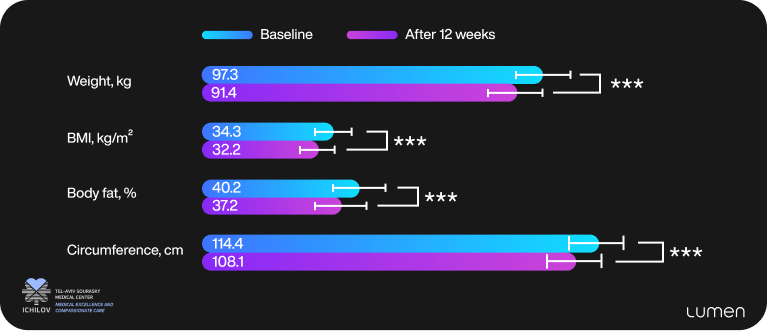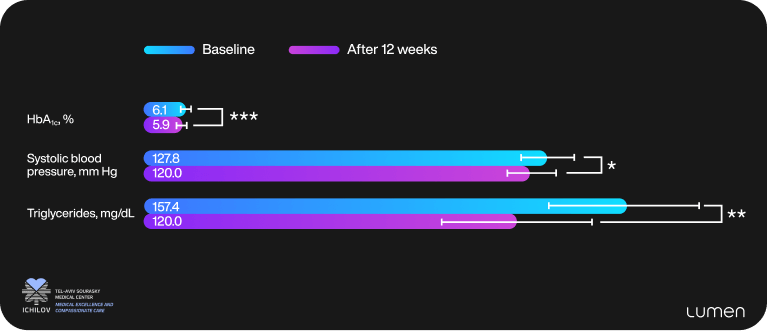The ultimate guide on how to eat for your metabolism


Are you confident that your food choices are healthy for you? Think again. Every day, millions of consumers make food choices that can profoundly impact their health and well-being. Yet despite a growing awareness of the importance of good nutrition, many of us continue to make poor choices that can lead to chronic health conditions, from diabetes to heart disease, that compromise our metabolic health.
Despite 54% of Americans paying more attention to healthy eating habits (1), 59% still fail to follow nutritional guidelines. With countless food options available, it's easy to fall into the trap of unhealthy choices that ultimately harm our bodies.
However, changing your nutrition habits is easier than you might think, and understanding how your body's metabolism works is the key to making the right decisions.
In honor of Nutrition Month, our Lumen nutritionists, scientists, and research team have teamed up to help you regain control of your health. By learning how your body's metabolism works, you can start making the right nutritional decisions and enjoy the health benefits!
Your metabolism is the engine that converts the food you eat into usable energy for your cells. It involves complex chemical reactions that break down macronutrients (carbohydrates, proteins, and fats) into fuel for your body. Maintaining metabolic health through balanced nutrition is crucial for achieving metabolic flexibility – the ability to efficiently switch between carbohydrate and fat oxidation based on your body's energy needs.
Brea Lofton, a registered dietitian at Lumen, explains, “To effectively shift to and from carb burn and fat burn, we need to eat and live in a way that promotes metabolic flexibility.”
Your metabolic health is directly linked to your nutritional choices. With the right fuel, your metabolism functions efficiently, making it easier to enter a fat-burning state. By forming healthy habits, you can achieve metabolically flexible and optimize your overall health.
"In order to really personalize your weight loss plan, you need first to assess your current metabolic health, taking into consideration your current nutrition habits, including your smoking and alcohol consumption and your regular eating times." shares Mia Johanna Dige, Lumen’s personal trainer and coach.
When we eat, a series of complex processes occur in our bodies to break down food and extract the necessary nutrients. The choices we make determine the kind of fuel we provide our metabolism.
If we think about our metabolism as an engine, it can easily be damaged with the wrong fuel (think diesel in a Bronco - that’s a huge no-no). In this case, 'diesel' is nutrient-poor food high in sugars. This triggers a vicious cycle: glucose levels spike and then quickly drop, leading to carb cravings and snacking. Our bodies become overwhelmed, storing excess carbohydrates as fat, potentially leading to weight gain, an inefficient metabolism, and, over time, insulin resistance – a precursor to type 2 diabetes.
You can promote stable blood glucose levels by following a personalized nutritional plan rich in whole foods, ample protein, healthy fats, and moderate carbs. This leads to less carb snacking and allows the body to tap the body's fat reserves for fuel. Carbs are then utilized for energy rather than stored as fat, enabling you to shift into fat burn overnight. Over time, your metabolic flexibility and insulin sensitivity will improve, making it easier to reach your health goals.
In a recent clinical trial (3), participants who used Lumen for 12 weeks achieved an average weight loss of 6% (13lbs lost) and significant reductions in body fat and waist circumference.

*** indicates statistical significance
Eating at the right time is crucial for nourishing your body and promoting fat burn. We know it's not always an easy task considering how on-the-go and messy life can be - leaving food as an afterthought or a junk drawer to save the day. However, this eating style can prevent the body from entering a fat-burning zone while asleep.
“Many people underestimate how important the time that you eat has on your health,” Marine Melamed, a registered dietitian at Lumen, shares, "The time you eat has a significant impact on your health, affecting your workouts, sleep, stress levels, and overall well-being."
Learning how your body responds to meal timing, snacks, and quality of nutrition can give you a vivid picture of your metabolic health.
According to a study in Physiology & Behavior (5), people consuming a high-calorie breakfast lost significantly more weight than those who consumed a high-calorie dinner. Finishing your last meal early (3 hours before sleep) positively impacts your metabolism and promotes fat burn. Eating at the right times, fasting, and finishing your meals earlier in the day can have a more significant impact on your physiology than you might realize.
Top Tips from our Lumen Nutritionists:
A macro diet focuses on balancing carbohydrates, protein, and fat, helping you build muscle, maintain a healthy weight, and avoid cravings or binges between meals. Eating these foods in the right quantities and at the right time will help you achieve sustainable weight loss and optimal metabolic flexibility.
To get started, you'll need to eat a balanced diet. Your body uses these macronutrients for energy and other functions. A healthy diet is approximately comprised of 40% carbs, 30% fat, and 30% protein - this can change daily depending on your activity and lifestyle. If you have trouble balancing your macros, try using the Lumen app which can automatically calculate a personalized amount based on your metabolism.
Your printable cheatsheet of healthy foods for your grocery list
To make shopping a breeze for you, download this Lumen cheat sheet PDF printable of healthy foods for your grocery list!
When you’re shopping or eating out, choose real, whole, nutrient-dense foods like lean proteins, healthy fats, fruits, vegetables, whole grains, and moderate healthy carbs. These foods promote stable glucose levels, reducing carb snacking and allowing your body to tap into fat reserves for fuel. Eating carbs in moderation promotes their utilization for energy rather than storage as fat, enabling you to shift into fat burn overnight and improve metabolic flexibility and insulin sensitivity over time.
This means more fruits and vegetables instead of starches like bread or rice. These foods help you snack less and also avoid sharp drops in blood sugar.
Whole, natural foods are the best way to fuel your metabolism. Avoid processed foods whenever possible and instead choose whole, unprocessed ingredients. These include: fresh fruits and vegetables, beans, legumes, and nuts, plus, whole grains like brown rice and oats.
Eat more fat, especially healthy fats like avocado and olive oil. Avoid trans-fats like those found in "addictive" food such as fried foods. Fats help you absorb vitamins and nutrients from other foods. They also keep you feeling full longer, which means less snacking. They can even help you lose weight if you eat the right fats –like those found in avocados, olive oil, nuts (especially walnuts), and fish like salmon or sardines that are rich in omega-3 fatty acids.
Your printable 7-day low-carb menu with recipes
Download this 7-day low-carb menu with easy-to-make recipes and food ideas for breakfast, lunch, and dinner.
Top Tips from Lumen’s Nutritionists on what to eat:
Enhancing mitochondrial function – the cellular powerhouses responsible for energy production – is essential for promoting metabolic flexibility. Lifestyle factors like balanced nutrition, regular exercise, restorative sleep, and stress management can optimize mitochondrial health and, consequently, your metabolism's efficiency.
Maintaining metabolic health involves various physiological processes, including:
Glycogen Management: Proper glycogen storage and utilization in the liver and muscles play a crucial role in regulating blood sugar levels and energy availability.
Insulin Sensitivity: Improving insulin sensitivity helps your body more effectively regulate blood sugar and prevent insulin resistance, a significant factor in metabolic disorders.
Muscle Mass: Building and preserving lean muscle mass through strength training and adequate protein intake supports a healthy metabolism and encourages fat burning.
Coenzyme Q10 (CoQ10): This crucial antioxidant supports mitochondrial function and energy production, potentially enhancing metabolic efficiency.
Circadian Rhythm Alignment: Synchronizing your eating patterns with your body's circadian rhythms can optimize metabolic processes and promote weight management.
Fitness and Activity Levels: Regular physical activity and exercise play a vital role in improving metabolic health, promoting muscle development, and enhancing overall fitness.
By addressing these physiological factors through a comprehensive approach to nutrition, exercise, and lifestyle habits, you can support your metabolic health and achieve sustainable weight management and overall well-being.
Adopting healthy eating habits can help preempt and manage conditions like diabetes, high blood pressure, high cholesterol, and elevated glucose levels. In the aforementioned clinical trial (4), participants who used Lumen for 12 weeks showed improvements in blood pressure, hemoglobin A1c (a measure of long-term blood sugar control), and blood lipid levels, particularly triglycerides (fat in the blood).

It might take time to get the hang of new habits, but eating healthy food at the right times, in the right portions - and sticking to them - can do wonders for your body and health.
"Focus on your mindset, and it will make it easier to shift your metabolism," advises our personal trainer and coach Mia Johanna Dige.
We have all heard that your mind is a powerful tool. Do not underestimate it when you are creating these new habits of eating! According to an article on Healthline (6), it takes about 66 days to create a new habit on average. That is more than two months of consistency, dedication, and intention to form a new way of eating and thoughts surrounding food.
One of the main mindset shifts to adopt is realizing this is not just a "diet" but a lifestyle. Diets typically only last for a certain period of time and yield minor results, only to gain the weight back once the diet is over. A lifestyle is a way of living, and recognizing this isn't a change that should torture you or deprive you of the good parts of life, but rather focus more on balancing whole, healthy foods into your everyday routine.
How do you know if you have made a lasting change? You track your progress! It can become defeating if you do not notice any changes in the mirror, and oftentimes, we do not recognize those changes since we see our physical bodies daily. “A metabolically flexible person wakes up more often burning fat and shifts easily to burning carbs after eating without storing it as body fat,” says Mia Johanna Dige, Lumen’s personal trainer and metabolic coach.
One way to keep the motivation going is to track real-time results by logging food, macros, weight, and inches! One of the best ways to track weight loss is to use a device that motivates you and helps you keep on track! Guidance and encouragement also go a long way when making a radical change to our lifestyle habits, especially when daily objectives drift and you need to get back on track. Consider joining online forums with people that share the same goals as yours.
You won’t always be able to stick to your plan perfectly and although "cheat meals" have a negative connotation to them, we like to encourage flexible eating. This simply means that once you have your macros dialed in, there is some wiggle room every now and then for that craving or chocolate (dark chocolate is a great healthy alternative). It helps immensely if you have been tracking with metrics and know where you can slide in those little treats at the most optimum times for your body! Balance is key, and anyway, who said you couldn’t make vegetables cool again?!
Lumen's approach includes finding a personalized solution for your specific body type. We focus on nutrition that can lead to stabilizing blood glucose, increases steady energy, and improves or dissolves the desire for binge eating or snacking altogether.
But, like any radical change, there are a few “make or break” principles to be aware of - like the importance of nutrition, and incorporating movement, sleep, and stress management into your life. Incorporating all four of these principles into your life can help you become more metabolically flexible, making it easier to achieve your health goals.
We hope this article has helped you better understand how to eat for your metabolism. It's not as simple as going on a diet or cutting out certain foods, but rather an awareness of what your body needs to function at its best. As a reminder, focus on your meal timing, eating whole, eating the correct macronutrients for your body, consuming whole, colorful foods, and avoiding sugar at all costs!
Don't forget that there are plenty of resources online that can guide you along the way: check out our blog post about seven ways how to boost metabolism here!
Funk, C. (2020, May 30). 1. public views about Americans' eating habits. Pew Research Center Science & Society. https://www.pewresearch.org/science/2016/12/01/public-views-about-americans-eating-habits/
Recent studies link energy regulation to the circadian clock at the behavioral, Garaulet, M., Froy, O., Itokawa, (2014, January 24). Timing of food intake and obesity: A novel association. Physiology & Behavior. https://www.sciencedirect.com/science/article/abs/pii/S0031938414000031
Pietrangelo, A. (2021, October 19). What you need to know about type 2 diabetes. Healthline. https://www.healthline.com/health/type-2-diabetes

Abigail Markman holds a Master’s degree in Nutritional Sciences, underscoring her vast knowledge of nutrition and health. She has been a practicing Nutritionist for several years, driven by her passion for empowering people with valuable insights into balanced nutritional intake and lifestyle habits and their significant role in promoting overall well-being.